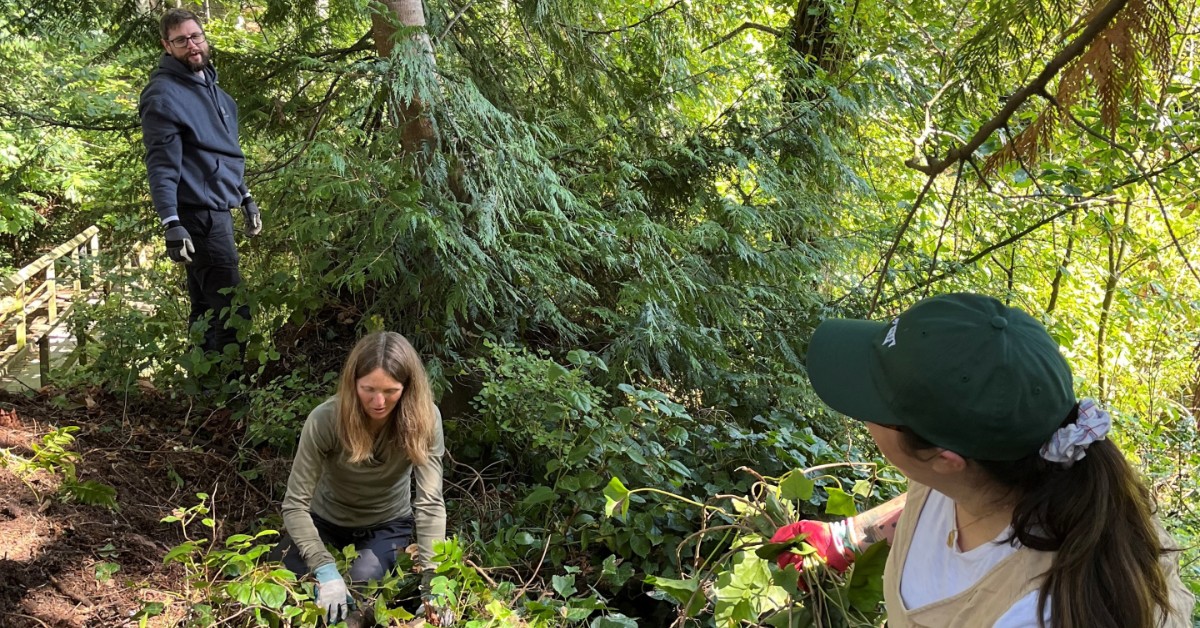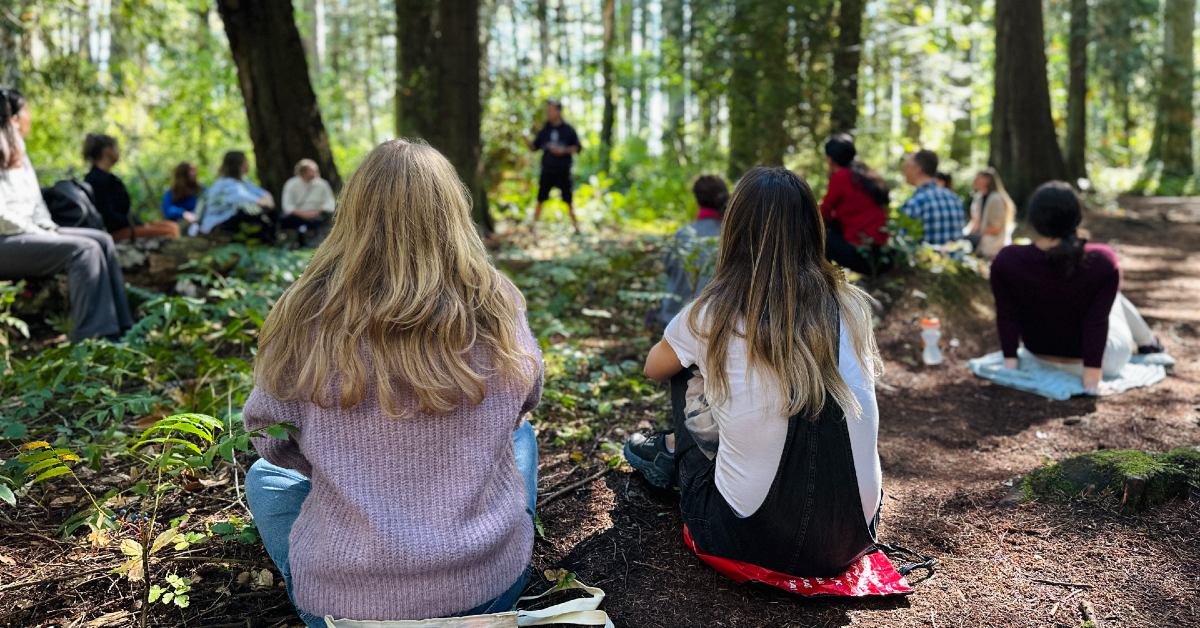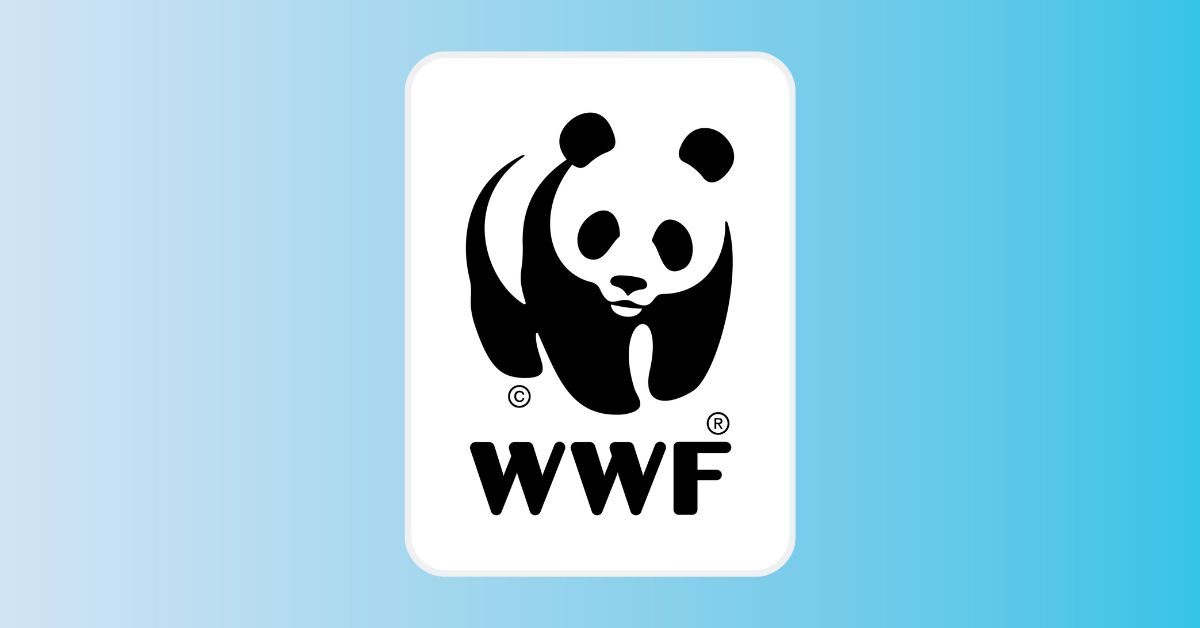Healthy Planet Club offers opportunity to connect with nature and community

The Healthy Planet Club offered twelve sessions in its 2024 season. The fun continues in 2025, with the club's first offerings held in January: Educational Forest Walk with Emma Lansdowne and Forest Bathing with Michelle Hamilton-Page.
Over 170 people took part in the events offered last year, with participants being able to choose from a variety of sessions ranging from Forest Bathing to shoreline litter clean-ups and restoration work focused on the removal of invasive species.
With the funding from World Wildlife Fund Canada’s Go Wild Grant, the Healthy Planet Club (HPC) was able to buy basic supplies for scheduled activities and to bring in session experts and facilitators.
The club offers students, faculty and staff opportunities for outdoor activities, environmental stewardship, and community engagement. Sessions are focused on taking care of this precious planet that we call home, and all are welcome to participate in events offered in 2025.
2024 Highlights
The Farm
Hosted by RRU’s Indigenous Education team, Farm & Food Systems Lead, Solara Goldwynn, and Cowichan Elder and Educator, Ken Elliott, HPC members joined the official groundbreaking of the Indigenous Medicine Garden. Participants planted seedlings and learned about medicinal and culturally relevant plants.
The Shore
Healthy Planet Club members celebrated Earth Day by contributing to a lagoon shoreline clean up. Professor Jonathan Moran kicked off the session with an overview of the ecology of the lagoon highlighting its significance as a thriving ecosystem, a National Migratory Bird Sanctuary and home to incredible marine life. Participants then spread out along the Esquimalt Lagoon shore to remove litter from this critical habitat.

The Forest
Several sessions were held to remove English Ivy in a forested area of campus next to the Colwood Creek. This area of the creek meets the ocean and is a critical salmon habitat and spot for culturally important plants to grow. Removal of invasive species will allow native species to rebound, boosting natural biodiversity.
Two English Ivy-removal sessions were facilitated by Loreisa Lepine, the Indigenous Land Steward at University of Victoria. She provided the context for ivy removal and shared Indigenous Knowledge teachings about native plants.
Garry Oak Ecosystem
Improving ecosystem health continued with the removal of Scotch broom by the Health Planet Club. The removal of invasive Scotch broom in Garry Oak ecosystems helped revitalize an area at the top of campus for native plant and animal species to rebound. These rare and endangered habitats in British Columbia serve as critical biodiversity hot spot for other important and endangered species, house culturally relevant plants for local Indigenous Nations and offer important resilience in the face of our changing climate. Scotch broom is very flammable due to its high oil content. Removing them from a drought-prone area reduces the fire hazard they present.

Connecting with Nature
The Healthy Planet Club invited students, faculty and staff to re-connect with nature through immersive experiences. Several sessions introduced participants to Forest Bathing guided by RRU associate faculty member Michelle Hamilton-Page.
Another club offering, offered by Master of Arts in Interdisciplinary Studies graduate, Shelley Doyle, was a workshop focused authentically connecting amidst the beauty of nature.
Both programs provided participants with exercises that engaged the senses and aimed to forge a stronger connection with the natural world, foster a deeper sense of belonging, and inspire positive change in themselves and the world.
Takeaways
Happy Planet Club sessions increase awareness, engagement and connections with the natural world and each other. The mix of revitalization work, nature appreciation and learning from expert facilitators provides a wide range of outdoor opportunities to support community building and climate action and tangibly improve natural habitats on campus.
Club activities also provide an opportunity for participants to meaningfully offer a small but significant effort towards decolonization. The sessions invite participants to connect more deeply to land and one another, fostering relationships and reciprocity. And, by removing European-introduced invasive species from the traditional Indigenous Lands of the Lekwungen-speaking Peoples, participants create space for native plant species to regrow and thrive.
The Healthy Planet Club will continue to offer similar sessions in 2025 with the first two taking place in January. On January 22 join RRU Gardener Emma Lansdowne for an Educational Forest Walk and on a January 28, try Forest Bathing with Michelle Hamilton-Page (no prior experience is needed.) Please register to join these and other sessions in 2025!

Thank you to the World Wildlife Fund Canada for selecting Royal Roads University as a 2024 Go Wild Grant recipient. We gratefully acknowledge the support of WWF-Canada.